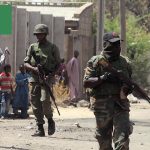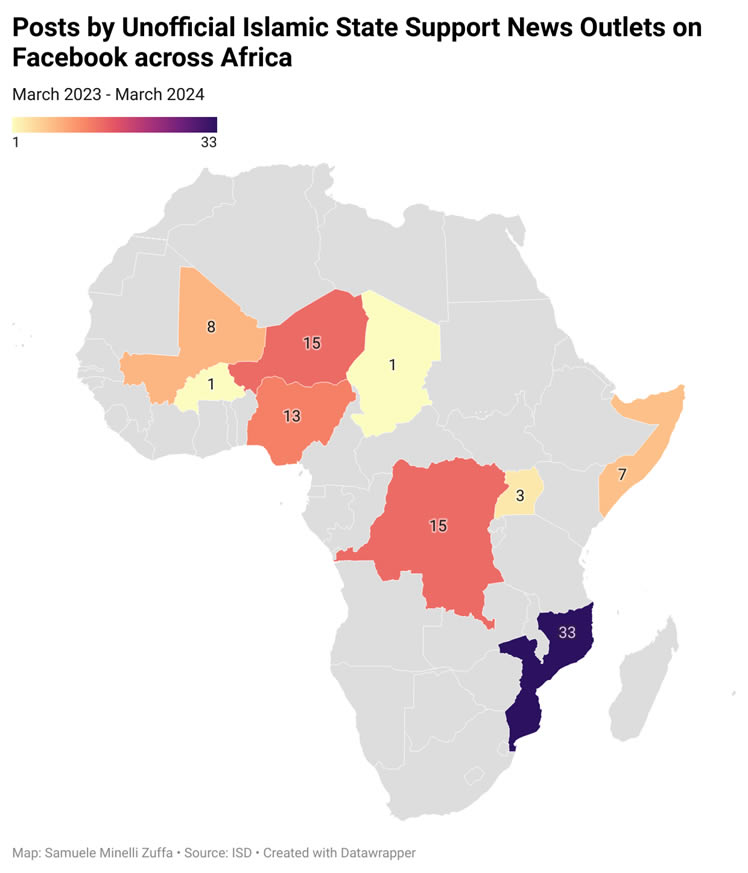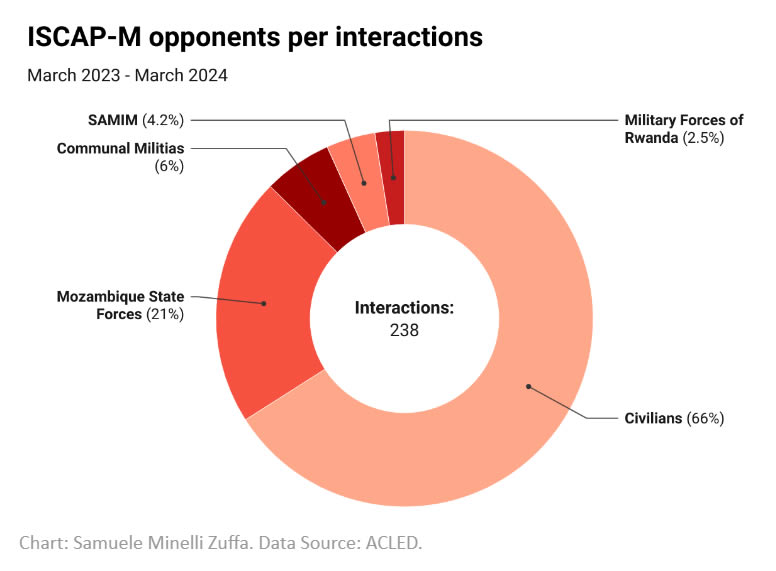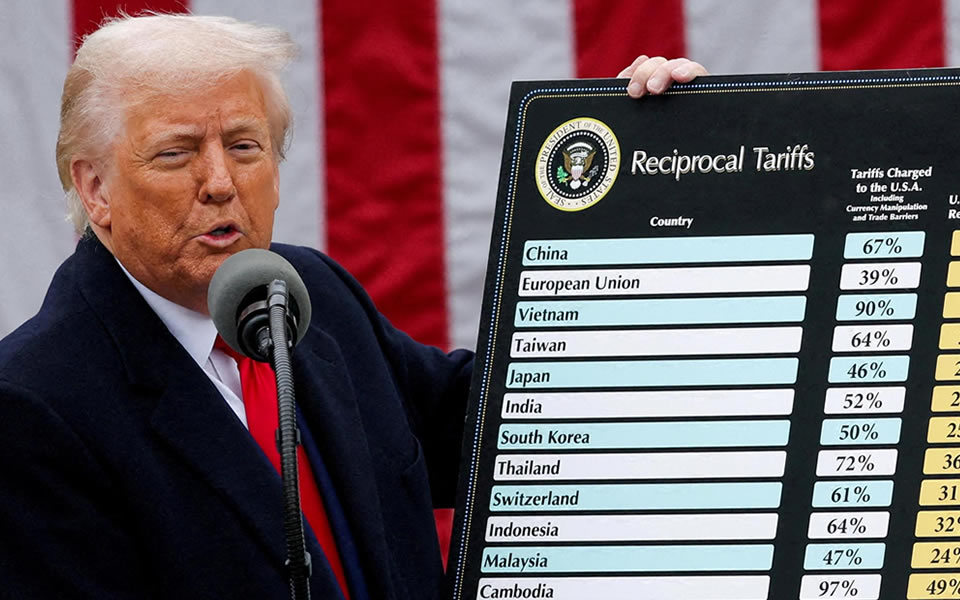
Extremism in West Africa: Focus on Boko Haram
April 1, 2024
Escalating Banditry in Nigeria: Strategic Implications
April 12, 2024EXTREMISM IN SOUTHERN AFRICA: FOCUS ON ISCAP-MOZAMBIQUE
Analysts: Samuele Minelli Zuffa
Senior Editor: Magdalena Breyer
What You Should Know
- Operational Region: Capo Delgado’s central districts (northern Mozambique) constitute the primary operational area of ISCAP-M, with Quirimbas National Park and its surroundings being the main sites of the group’s operations. In early 2024, the group also operated in Capo Delgado’s southern districts (Chiure, Mecufi), even threatening northern Nampula province.
- Shift in Tactics in 2023: ISCAP-M activities decreased by 60% over the last year (March 2023-March 2024), registering record-low activity between February and December 2023. Since January 2024, the group has more than doubled its operations, with attacks against civilians tripling, looting and property destruction rising by 2000%, and abduction remaining a widely employed tactic. The group has simultaneously intensified its propagandistic online presence to foster the influx of foreign fighters.
- Expansion in 2023: During the 2024 escalation, ISCAP-M has progressively moved southward, targeting civilian communities in Chiure and Mecufi districts, while maintaining its primary geographic scope in Capo Delgado. This expansion will possibly affect Nampula province’s northern districts over the next three months.
- Regional Impact (Forecast): Violence associated with ISCAP-M will very likely continue to escalate in the following months. The group will very likely seek to leverage the progressive withdrawal of the Southern African Development Community Mission in Mozambique (SANIM) and the persistent ethnic tensions, religious cleavages, and socio-economic grievances to foster local recruitment. The heightening online propaganda will possibly increase the regional influx of foreign fighters, raising the group's capabilities and its scarce international footprint.
Introduction
After 10 months of relative calm, ISCAP-M intensified its activities in Capo Delgado during the first months of 2024, very likely in an attempt to capitalize on SAMIM’s progressive withdrawal. , Between January and February 2024 the group focused on targeting hostile communities, looting and destroying property, and abducting civilians, while simultaneously clashing with the Mozambican Defence Armed Forces (Forças Armadas de Defesa de Moçambique, FADM) and significantly increasing its online propaganda.
This assessment analyses ISCAP-M’s operational area, tactics, and impacts in northern Mozambique last year (March 2023 - March 2024). Understanding the group’s continuation and departure from its past trends is essential for elaborating more effective counterinsurgency strategies amid ISCAP-M’s re-escalation of violence in Capo Delgado and expansion into its southern districts.

In December 2023, Maj. Gen. Nampele (Commander of Mozambique Army) announced that ISCAP-M had been defeated and about 95% of the territory that was captured by the militants has been secured.
Geographical Areas of Activity in 2023
ISCAP-M operated only in Mozambique during the past year, despite the group’s prior attempts to expand its operations in Mtwara (southern Tanzania) between 2020 and 2022. Enhanced national and international counterinsurgency initiatives forced ISCAP-M to limit its operations to Capo Delgado. ISCAP-M escalated violence in early 2024 following a substantial 70% decline in both incidents and related fatalities throughout 2023. While most events still occur in the Capo Delgado province, the group has expanded its activities towards the south-east since February 2024, threatening Pemba (the provincial capital), Chiure, Anacuabe, Mecufi districts, and the northern Nampula province.
Timeline of Key Events
2007
Foundation of Al-Sunnah Wal-Jamaa (السنة والجماعة, ASWJ), a salafi-wahhabi sect preaching rejection of corrupt society and criticising injustice, in the district of Balama (Capo Delgado, MZ).October 2017
ASWJ begins shifting towards violent tactics.November 2019
ASWJ swears allegiance to the Islamic State (IS), joining forces with the Allied Democratic Forces (ADF) in the eastern Democratic Republic of Congo and Uganda to form the Islamic State Central Africa Province (ISCAP).April 2021
Total suspends its US$20 billion Liquified Natural Gas (LNG) investment in the Afungi Peninsula (Capo Delgado, MZ) due to rising violence.Summer 2021
Rwanda and the Southern African Development Communty (SADC) launch two military missions. The United States and the European Union embark on two military trainings for Mozambican troops.2022
The increasing coordination between FADM and international forces inflicts heavy human and capability losses on ISCAP-M.May 2023
Total resumes the LNG project in Capo Delgado after a 90% decrease in ISCAP-related fatalities compared to the previous year.Early 2024
ISCAP-M re-escalates violence in Capo Delgado, progressively advancing its attacks towards the south. Critical incidents evidencing this escalatory southward trend include ISCAP’s victorious armed clash with FADM on February 9 in Mucojo (Macomia, central Capo Delgado), the civilian targeting in Chiure district (southern Capo Delgado), and the occupation of Quissanga district headquarters (Quissanga, central Capo Delgado) on March 2.
Tactics and Techniques
According to ACLED, about 292 incidents involving ISCAP caused at least 251 fatalities last year (March 2023 - March 2024). The distribution of incident types are as follows:
Attacks
Armed Clashes
Looting & Property Destruction
Abductions
Remote Explosives, Landmine & IED
Others
ISCAP Mozambique Tactics, Techniques & Procedures (TTP) and capabilities are characterised by:
Attacks & Beheadings
ISCAP-M has targeted civilians in more than 50% of its activities since the beginning of the insurgency in 2017, rendering them the most affected actor. The group predominantly targets Christian communities to eliminate “infidels” (كافر) and foster displacement. ISCAP-M civilian targeting techniques draw from ISIS repertoire. Public demonstrations of force, such as public beatings and beheadings, function to obtain civilians' compliance with the group’s activities by instilling fear.
Armed Clashes & Ambushes
ISCAP-M clashes with state forces, international troops, and communal militias. The group often resorts to ambushes and assaults against FADM’s bases, perceiving them as an easier target than international contingents. Apart from reasserting their predominance over certain territories, the attacks are functional for seizing weapons and equipment.
Offline & Online Propaganda
The group resorts to both offline and online propaganda. While rhetorically advocating for global jihad, ISCAP-M leverages highly localised grievances to foster recruitment. In its public statements, the group criticises Maputo's elite for enabling international firms to exploit Capo Delgado's resources, leading to the displacement of communities (such as in the Afungi peninsula) and the incarceration of artisanal miners (garimpeiros). Social network pages informally connected to ISCAP-M have been increasingly active online and encouraging international supporters to join the group (hijrah, هجرة). Over the last year, unofficial Islamic State Support news outlets on Facebook have mentioned Mozambique as the top destination for hijrah, accounting for more than one-third of their posts.

Looting & Property Destruction
ISCAP-M performs looting and property destruction with both symbolic and practical aims. The group engages in burning churches and destroying goods banned by Sharia law (eg. cigarettes and alcohol). For instance, ISCAP-M burned the local church and four other houses in Nahovi village (Chiure, Cabo Delgado) on February 27, 2024. The jihadists frequently target buildings associated with state presence, such as secular schools, health facilities, and administrative buildings. ISCAP-M has also stricken infrastructure related to the extractive sector (rubies, LNG). These actions constitute the practical side of its rhetorical claim against the Mozambican political-economic elite and international extractive companies. ISCAP-M mainly performs looting against adverse communities to seize fuel and food.
Abductions
TISCAP-M engages in kidnapping for ransom to increase the organisation’s size and acquire essential capabilities. Victims of kidnapping for ransom are predominantly Mozambican villagers from Capo Delgado province, meaning that revenue extraction from this activity remains limited and is not the primary driver of this activity. The group’s primary focus remains on increasing its size, targeting professionals (e.g. doctors), women, and children to strengthen its demographic base and improve its capabilities. 70 children are missing in Capo Delgado following the February 2024 escalation.
Impact Over the Last Year
ISCAP-M was involved in 292 incidents last year, marking a 60% decrease from the previous period. Related fatalities amounted to 251, representing a substantial decrease of 84% in the recorded fatalities from the precedent period. Despite 2023’s significant decreases in ISCAP-M violence permitting the resumption of relevant extractive projects, such as Total’s multi-billion investment in the Afungi Pensinsula (Palma, Capo Delgado), the group has escalated violence in the first months of 2024.
The period between December 2023 to February 2024 accounts for 44% of incidents and 40% of fatalities recorded over the last year. ISCAP-M has very likely exploited the progressive withdrawal of SAMIM to intensify its offensive in Capo Delgado, although violence has not reached 2022 levels. In August 2023, SADC announced its plan to withdraw its contingents from Capo Delgado, citing economic hardships, with the withdrawal expected to be completed by July 2024. This intensification resulted in the doubling of incidents and fatalities featuring ISCAP-M in the last three months compared with the period between September and November 2023.
In particular, the group more than doubled its attacks on civilians between December 2023 and February 2024 compared to the same period just prior. Following the attacks in Muidumbe and Macomia districts in December 2023, the group has continued to target Capo Delgado’s northwest while expanding its activities southward, performing attacks in Ancuabe, Pemba, Mecufi and Chiure (Capo Delgado’s south-east) and threatening northern Niassa Province. ISCAP-M’s violent escalation in February 2024 has displaced almost 70,000 people in southeastern Capo Delgado, mainly in Chiure district.
Opponents & Collaborators Over the Last Year
Main Opponents
ISCAP-M’s opponents have generally remained unchanged since the group’s creation. 66% of the group’s physical activities entail violence against the civilian population, making them the primary target. Mozambican State forces (FADM, Police) represent the second most relevant opponent, constituting between 10 and 20% of the group’s engagement over the last two years. SAMIM and RDF remain substantial opponents after their intervention in the summer of 2021, respectively accounting for 4.2% and 2.5% of the group’s events. Finally, ISCAP has clashed with various communal militias (e.g. Naparama, Muidumbe, Mocimboa da Praia), which violently interacted 14 times last year.

Forecast
ISCAP-M will very likely pursue violent escalation over the next three months, likely continuing the expansion towards the southern districts of Capo Delgado (Chiure, Mecufi) and threatening the northern districts of Nmapula province. Quirimbas National Park and the surrounding areas (e.g. Pemba Bay) will likely represent a central hotspot for ISCAP-M economic and violent activities in the coming months, given its central position in Capo Delgado and relevance for the illicit trade of Rubies, Heroin, cocaine and methamphetamines.
The group will very likely continue to exploit ethnic tensions, religious differences, and socio-economic grievances to foster local recruitment. ISCAP-M will likely seek to capitalize on SAMIM’s progressive withdrawal and FADM’s deficiencies by incrementally adopting looting and property destruction techniques to resupply goods and weapons and implementing its integralist moral agenda. The group will likely avoid large-scale symbolic actions against multinational corporations due to its limited firepower and the high-security levels around extractive infrastructures, likely preferring to engage in rural areas and small-scale public destruction of “impure goods” (e.g. cigarettes, alcohol) in the upcoming three months. ISCAP-M will very likely increasingly employ civilian targeting and abductions to eliminate or displace hostile communities and increase its demographic base. The group will very likely preferentially target Christian communities in Capo Delgado, driven by ISCAP-M’s salafi-jihadist ideology and the desire to expand its controlled territory.
The online propaganda campaign will likely intensify over the next three months amid national and international actors' likely underestimation of the jihadist crisis, as indicated by SAMIM’s imminent retreat. The campaign will likely target regional and international radicalised audiences to foster recruitment and enhance ISCAP-M’s limited international outreach and ties. IS has very likely noticed the decreasing attention paid to Capo Delgado’s insurgency, following the low levels of violence registered during the majority of 2023 and resumption of principle extractive projects, and likely wants to exploit this conducive situation to revive violence, foster hijra, and gain territory. Even if the hijra is unlikely to reach the same international levels experienced in Syria and Iraq, ISCAP-M will likely attract radicalised individuals from southeastern Africa. Most foreign fighters will possibly come from Swahili-speaking countries (e.g. Tanzania) because of their geographical proximity, language compatibility, and absence of other jihadist insurgencies in the area.
Niassa Special Reserve will possibly constitute the gateway for ISCAP-M activities towards Niassa province if the insurgency gains enough momentum. The reserve’s centrality for illicit routes and poaching, combined with its strategic position at the border with Tanzania, very likely renders it an appealing long-term objective for the group. Considering that the group never managed to expand to Niassa province during its maximum expansion between 2020-2021, ISCAP-M will likely primarily focus on the coastal areas, attempting to gain control of the profitable illicit routes (such as Drugs, Rubies, Wildlife) that the pass through the main ports (such as Palma, Mocimboa da Praia and Pemba).



